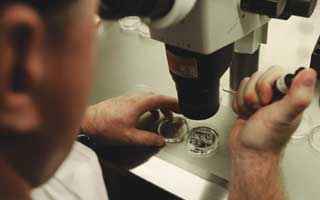The Food and Drug Administration on Wednesday approved the first gene therapy treatment that could offer a permanent cure for patients who suffer from a rare blood disorder, which the manufacturer priced at $2.8 million per patient.
The cost would make the therapy one of the most expensive treatments of all time.
The therapy was developed by bluebird bio and will be sold under the brand name Zynteglo. It offers a treatment for beta-thalassemia, a type of inherited blood disorder that causes a reduction of normal hemoglobin, a protein in red blood cells that carries oxygen through the body.
The reduced levels of hemoglobin can lead to a number of health issues including dizziness, weakness, fatigue, bone abnormalities and more serious complications. The sickest patients— those who would use Zynteglo— require regular red blood cell transfusions every two to five weeks.
The lifetime cost of medical care for a patient with transfusion-dependent beta-thalassemia can reach up to $6.4 million in the U.S., the company said. Patients also usually have a shorter lifespan.
The single-dose treatment could be a game changer. It works by genetically modifying a patient’s bone marrow stem cells, making it so they are able to produce functional hemoglobin. It is meant for adults and children.
The treatment’s $2.8 million price tag was set “in recognition of its robust and sustained clinical benefit demonstrated in clinical studies and its potential to alleviate a lifetime of health care costs associated with regular [red blood cell] transfusions and iron management,” the company said in a statement.
The company said it will reimburse contracted commercial and government payers up to 80 percent of the cost of the therapy if a patient fails to achieve and maintain transfusion independence up to two years following infusion.
Bluebird said it is in “late-stage negotiations” with leading commercial payers, and is also working with state Medicaid agencies.














